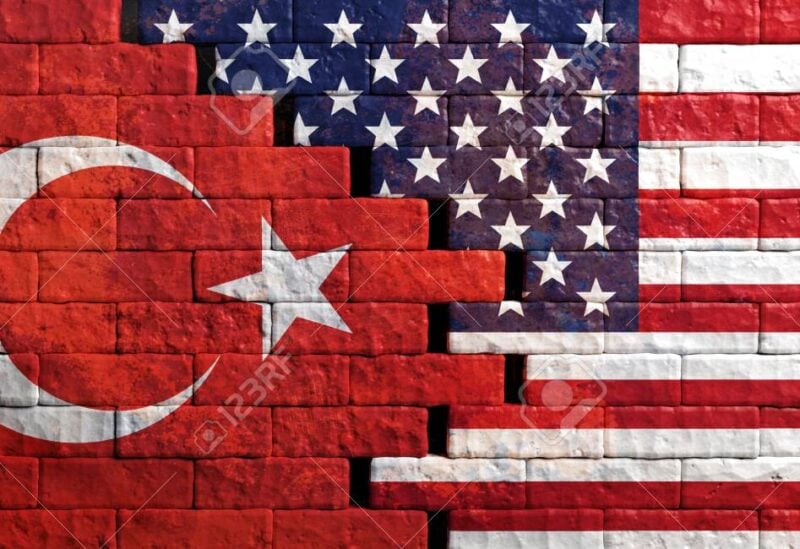
American and Turkish flags
Positive effects on bilateral ties, will come out of the American and Turkish cooperation to ensure the safe operation of Afghanistan’s Hamid Karzai International Airport in Kabul argues Michael Doran, a senior fellow at the US-based Hudson Institute.
In an interview with Anadolu Agency, Doran commented on Turkish and American ties along with recent developments in Afghanistan from where the US is scheduled to withdraw by the end of August.
“I think it’s going to have an extremely positive impact on the broader relationship, or at least, it’s going to have a very positive impact on the military-to-military relationship between the United States and Turkey,” he said, referring to cooperation on securing the airport.
Underlining that the military relationship was the very “bedrock” of ties, Doran said: “And since the United States started supporting the YPG, that relationship has really soured, and I think that the faster we can get back to strong military-to-military cooperation, the better it will be for both countries.”
“The Turkish leadership has recognized that the United States is pulling back but it still has interests, and it realizes that Turkey has certain capabilities that it can bring to the fore which would be a great service to the United States and to the alliance,” he said, adding it bodes well for the future of relations.
Doran said the US should cut its relationship with the YPG, which Turkey views as the Syrian branch of the PKK terror group.
“I personally have always thought that the partnership with the YPG was extremely short-sighted and, and frankly wrong because my view is that the YPG is the PKK,” he said. “The United States is supporting the enemy, the most hated enemy of our closest ally, [it] doesn’t make any sense.”
“I think there’s a growing awareness of that in the United States,” he said.
Stressing that the US administration has gotten itself into such a position, he said, “if it were up to me, personally, I would sever the relationship with the YPG and work with the Turks directly to achieve the outcomes that we need to achieve in Syria.”
The senior expert said former US President Barrack Obama’s Iran policy took the US into this situation — where Washington established ties with the YPG/PKK, claiming it needed the group but the partnership later somehow transformed into a strategical one with the YPG/PKK seizing territory and it began to govern captured regions.
“You have to understand the strategic mindset of the Obama administration. The Obama administration was, in a stealthy way without admitting it to the American people across the board, in the Middle East, was aligning the United States with Iran,” he said. “It did not want to support the opposition to [Bashar al-]Assad because Assad is Iran’s closest ally,” said Doran.
He noted that Obama, before the American public, felt obliged to fight the ISIS terror group, also known as Daesh, and he was trying to figure a way to achieve it without damaging relations with Iran.
Commenting on the complexity of the political terrain in the region, he noted that the Obama administration viewed working with the Turks, to take care of the ISIS/Daesh problem, would harm ties with Iran and Russia because it would mean strengthening the opposition against Assad and making the Iranian nuclear deal an impossible task.
“So, the middle position was to work with the YPG, because, historically, the PKK has had good relations with Russia. Okay relations with Iran, and it could come to a modus vivendi with the Assad regime,” he said, adding that the Assad regime preferred the power vacuum be filled by the YPG/PKK instead of Turkey despite not liking Kurdish separatists.
“And so, the United States adopted that position, but it never admitted it publicly, and a lot of people in Washington still don’t understand that,” he said.
Doran said Iranian proxies targeted US forces in Iraq and Syria while President Joe Biden’s administration was attempting to reach an agreement with Tehran, and this was a contradiction.
“This makes no sense. It’s fanciful to believe that that the regime is going to ever cut a deal with the United States,” he said. “And so, the proper thing to do is to work with our ally Turkey, with whom we have half a century of cooperation on strategic questions in order to stabilize that part of the world.”
On the role of the US in the context of the dispute in the Eastern Mediterranean, where Ankara and Athens are at odds, Doran said mediation is the most proper role the US could adopt.
He said the Greek approach, which aims to confine Turkey to its shores, was “completely unrealistic.”
“There is no commercially viable route for Eastern Mediterranean gas, say Israeli gas, to go from Israel to Europe through Greece,” he said. “This is a fantasy. The commercially viable route is through Turkey.”
An agreement between Turkey and Greece would benefit all regional actors, he said.